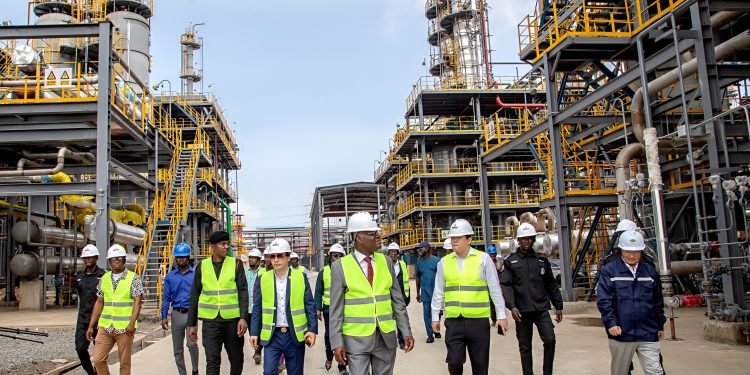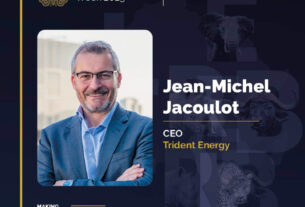Sentuo Oil Refinery Ltd. (SORL) received a working visit from the Minister of Trade and Industry, KT Hammond, who praised the project as a potential solution to Ghana’s refinery issues.
The project, which complies with the government’s “One District One Factory” (1D1F) development policy, will produce/refine 5 million tonnes of all types of crude assays annually, with an output of 3.2 million tonnes of refined petroleum products, including petrol, kerosene and diesel of high quality exceeding the Euro IV Standard. When the two Phases of the Project are fully finished and commissioned, the refinery will also produce 400,000 tonnes of By-Products including Polypropylene, Liquefied Gas, Ammonium Sulphate, Sulfuric Acid, and Sulphur. It will also produce 350,000 tonnes of a variety of Pitch Products, 200,000 tonnes of lubricating Base Oil and Solvent Naphtha, and 350,000 tonnes of a series of Pitch Products.
After giving the investors a glowing review of the facility, KT Hammond praised them profusely and praised the project as a prime example of the President’s industrialization and development agenda against the backdrop of the 1D1F.
“I am overwhelmed by this huge structure. I have been seeing images of the plant, and today I decided to pay a visit to see progress of work and in fact, I’m impressed with what I’ve seen so far.”
The Minister bemoaned the enormous sum of money that the nation spends each year on the importation of refined oil and gas products and expressed hope that this project had arrived at the right time to address this issue.
The Sentua Group’s top delegation, led by Chairman XU Ning Quan, welcomed the Minister upon his arrival.
The Chairman of the Sentuo Group, XU NING QUAN, stated in his welcome speech that the Sentuo Group has Ghana’s best interests at heart and that this has influenced its decision to invest in critical economic sectors for accelerated development.
He specifically mentioned the Sentuo Oil Refinery, saying that it was created in response to the need to strengthen Ghana’s energy sector while refining high-quality oil and gas products at competitive prices.
XU NING QUAN was confident the project would have a positive effect on revenue generation (taxes, levies, etc.), create a significant amount of employment, save money on foreign exchange, provide customers with value (lower prices, higher-quality products, local crude oil), and establish community relations and CSR activities with focus areas including: Health, Education, Sanitation, and Social/Humanitarian.
He urged the government to use the GITC Act 926 of 2016 to support the creation of effective fair trade measures for the domestic petroleum refining industry and to check anti-dumping, subsidy and countervailing, and safeguard measures to stop unfair trade practises.
However, in order to ensure the project runs smoothly, XU NING QUAN urged immediate attention to and solutions to problems with Test Run Permits (NPA), Natural Gas Connectivity and Supply, Access to Foreign Exchange, Crude Oil Supply Support (Local & Foreign), Tax Waiver on Materials, Equipment & Machinery (Phase II), and Motorable Access Roads.
Sentuo Oil Refinery
The Sentuo Oil Refinery was conceived from the Chinese government’s Belt and Road Development Strategy for the oil and gas industry in China & Africa.
Following extensive research and consultations, the Sentuo Group settled on Shanghai HoTo Engineering’s oil refinery technology.
Phase 1 of the “Sentuo Oil Refinery Limited (SORL)” is almost finished, barring any remaining regulatory issues. The Phase 2 is anticipated to be finished in January 2024 and will have a 5 million tonne per year (tpy) capacity. The Refinery is situated in Ghana, a country in West Africa, in the Tema Industrial Zone.
The Sentuo Oil Refinery essentially takes into account important elements like cutting-edge scientific innovation and technology, energy efficiency and environmental protection, recycling economics, phase-and-rolling development, and the scalability of production capacity and quality; all of which are essential elements of any new production and/or manufacturing project.





